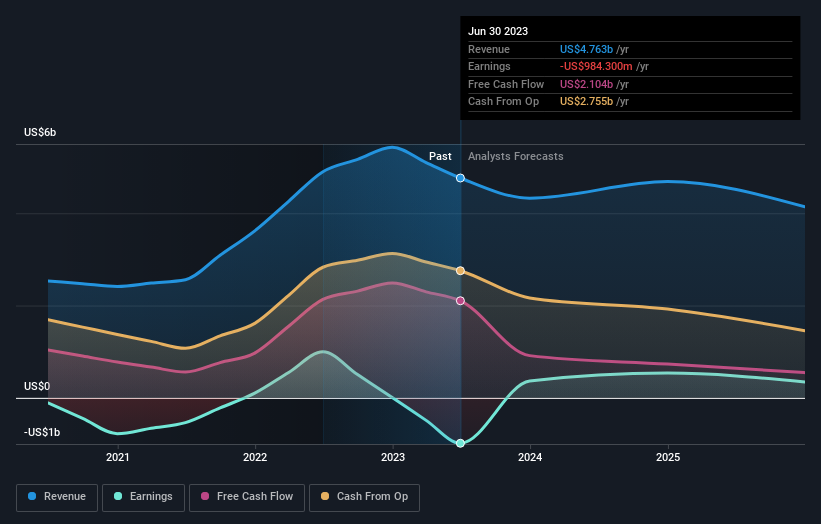Earnings Miss: Harbour Energy plc Missed EPS And Analysts Are Revising Their Forecasts
Last week, you might have seen that Harbour Energy plc (LON:HBR) released its half-yearly result to the market. The early response was not positive, with shares down 2.5% to UK£2.34 in the past week. Revenues fell 5.6% short of expectations, at US$2.0b. Earnings correspondingly dipped, with Harbour Energy reporting a statutory loss of US$0.01 per share, whereas the analysts had previously modelled a profit in this period. Following the result, the analysts have updated their earnings model, and it would be good to know whether they think there's been a strong change in the company's prospects, or if it's business as usual. So we collected the latest post-earnings statutory consensus estimates to see what could be in store for next year.
View our latest analysis for Harbour Energy
After the latest results, the consensus from Harbour Energy's ten analysts is for revenues of US$4.33b in 2023, which would reflect a definite 9.2% decline in revenue compared to the last year of performance. Earnings are expected to improve, with Harbour Energy forecast to report a statutory profit of US$0.44 per share. Yet prior to the latest earnings, the analysts had been anticipated revenues of US$4.22b and earnings per share (EPS) of US$0.45 in 2023. Overall it looks as though the analysts were a bit mixed on the latest results. Although there was a to revenue, the consensus also made a small dip in its earnings per share forecasts.
There's been no major changes to the price target of UK£3.52, suggesting that the impact of higher forecast revenue and lower earnings won't result in a meaningful change to the business' valuation. Fixating on a single price target can be unwise though, since the consensus target is effectively the average of analyst price targets. As a result, some investors like to look at the range of estimates to see if there are any diverging opinions on the company's valuation. Currently, the most bullish analyst values Harbour Energy at UK£4.84 per share, while the most bearish prices it at UK£2.14. This is a fairly broad spread of estimates, suggesting that analysts are forecasting a wide range of possible outcomes for the business.
Of course, another way to look at these forecasts is to place them into context against the industry itself. These estimates imply that revenue is expected to slow, with a forecast annualised decline of 17% by the end of 2023. This indicates a significant reduction from annual growth of 31% over the last three years. By contrast, our data suggests that other companies (with analyst coverage) in the industry are forecast to see their revenue decline 2.7% annually for the foreseeable future. So it's pretty clear that Harbour Energy's revenues are expected to shrink faster than the wider industry.
The Bottom Line
The most important thing to take away is that the analysts downgraded their earnings per share estimates, showing that there has been a clear decline in sentiment following these results. They also upgraded their estimates, with revenue apparently performing well, although it is expected to lag the wider industry this year. The consensus price target held steady at UK£3.52, with the latest estimates not enough to have an impact on their price targets.
Following on from that line of thought, we think that the long-term prospects of the business are much more relevant than next year's earnings. At Simply Wall St, we have a full range of analyst estimates for Harbour Energy going out to 2025, and you can see them free on our platform here..
You still need to take note of risks, for example - Harbour Energy has 1 warning sign we think you should be aware of.
Have feedback on this article? Concerned about the content? Get in touch with us directly. Alternatively, email editorial-team (at) simplywallst.com.
This article by Simply Wall St is general in nature. We provide commentary based on historical data and analyst forecasts only using an unbiased methodology and our articles are not intended to be financial advice. It does not constitute a recommendation to buy or sell any stock, and does not take account of your objectives, or your financial situation. We aim to bring you long-term focused analysis driven by fundamental data. Note that our analysis may not factor in the latest price-sensitive company announcements or qualitative material. Simply Wall St has no position in any stocks mentioned.

